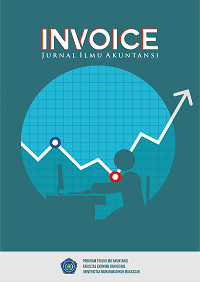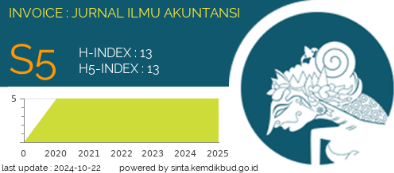Analysis of SAKTI User Satisfaction Using the Importance Performance Analysis (IPA) Method
DOI: https://doi.org/10.26618/inv.v6i1.14371
Abstract
The Ministry of Finance has officially launched the Institutional Level Financial Application System (SAKTI) for all work unit of Ministry/Institutional in 2022. Seeing the diverse characteristics of work unit throughout Indonesia, there will potentially be many problems that users will face. During the piloting stage from 2015, various problems were found that made end users unsatisfied. This study aimed to find out: (1) the level of satisfaction of SAKTI users after it was officially implemented in all work unit of Ministry/Institutional; (2) the attributes that need to be improved and maintained in SAKTI based on 5 End User Computing Satisfaction (EUCS) variables, namely Content, Accuracy, Format, Ease of Use, and Timeliness. This study used primary data through a survey of 107 respondents as sample from 78 work unit of KPPN Makassar II. The data were analyzed using importance performance analysis (IPA). The results of this study showed that: (1) based on the t test, analysis of the level of conformity and analysis of the performance-expectation gap based on the 5 EUCS variables, SAKTI's quality was good in meeting user expectations with user satisfaction level of 96%. Gap analysis shows that all EUCS variables are negative (<0), which means that the quality of SAKTI's performance has not met user expectations; (2) based on the Cartesian diagram mapping, there are 12 top priority attributes that must be implemented according to the expectations of SAKTI users and their performance must be improved and maintained.References
Amriani, T. N., & Iskandar, A. (2019). Analisis Kesuksesan Implementasi Sistem Aplikasi Keuangan Tingkat Instansi (SAKTI) pada Satuan Kerja di Lingkungan Badan Pendidikan dan Pelatihan Keuangan (BPPK). Kajian Ekonomi dan Keuangan, 3(1), 54–74. https://doi.org/10.31685/kek.v3i1.409
Abdullah, I., Firdaus, A., & Marsuni, N. S. (2023). Entrepreneurial Success Examined through Social Capital and Entrepreneurial Competence among MSME Operators in the PTB Tourist Attraction in Maros City. Economos: Jurnal Ekonomi dan Bisnis, 6(3), 219-232.
DeLone, W. H., & McLean, E. R. (1992). Information Systems Success: The Quest for the Dependent Variable. Information Systems Research, 3(1), 60–95. http://www.jstor.org/stable/23010781
Doll, W. J., & Torkzadeh, G. (1988). The Measurement of End-User Computing Satisfaction. MIS Quarterly, 12(2), 259. https://doi.org/10.2307/248851
Gea, M. (2020). Analisis Tingkat Kepuasan Pelayanan PT BNI Syariah Cabang Medan Dengan Importance Performance Analysis (IPA).
Hadi, M. (2022). Faktor yang Memengaruhi Keberhasilan Implementasi Aplikasi SAKTI Berdasarkan Perspektif Pengguna. Politeknik Keuangan Negara STAN, 390.
Hamzah, Z., Purwati, A. A., Suryani, F., & Hamzah. (2019). Quality Improvement Strategy of Islamic Banking Services in Indonesia Through the Integration of Servqual and Importance Performance Analysis (IPA). Revista, 40(30), 13.
Ilias, A., & Abd Razak, M. (1970). End-user computing satisfaction (EUCS) towards computerised accounting system (CAS) in public sector: a validation of instrument. The Journal of Internet Banking and Commerce, 16(2), 1-17.
Istianah, E., & Yustanti, W. (2022). Analisis Kepuasan Pengguna pada Aplikasi Jenius dengan Menggunakan Metode EUCS (End-User Computing Satisfaction) berdasarkan Perspektif Pengguna. Journal of Emerging Information Systems and Business Intelligence, 03(04), 36–44.
Ives, B., Olson, M. H., & Baroudi, J. J. (1983). The Measurement of User Information Satisfaction. Communications of the ACM, 26(10), 785–793.
Kementerian Keuangan. (n.d.). Diakses Maret 3, 2023. Peluncuran SAKTI Tandai Integrasi Sistem Pengelolaan Keuangan Pemerintah. Jakarta: Direktorat Jenderal Perbendaharaan Kementerian Keuangan. https://djpb.kemenkeu.go.id/portal/id/berita/berita/siaran-pers/3842-peluncuran-sakti-tandai-integrasi-sistem-pengelolaan-keuangan-pemerintah.html
Kotler, P. (2009). Manajemen Pemasaran. Jakarta: Erlangga.
Marsuni, N. S., Arum, R. A., Mariana, L., & Nersiyanti, N. (2023). Abnormal Comparison Analysis of Return and Trading Volume Activity Before and After The Announcement of The Covid 19 Pandemic. Economos: Jurnal Ekonomi dan Bisnis, 6(3), 276-285.
Nasrullah, N., Mariana, L., Marsuni, N. S., & Dharma, S. (2023). The Influence of Soft Skills and Adversity Quotient on Work Readiness of Students in the Faculty of Economics at Muhammadiyah University Makassar. Economos: Jurnal Ekonomi dan Bisnis, 6(3), 247-258.
Nasrudin, E., & Widagdo, A. K. (2020). Determinan Kepuasan Pengguna Sistem Aplikasi Keuangan Tingkat Instansi dan Pengaruhnya Terhadap Individu dan Organisasi. Jurnal Manajemen Perbendaharaan, 1(1), 69–94. https://doi.org/10.33105/jmp.v1i1.351
Nugroho, H. P., & Lestyowati, J. (2020). Analisis Tingkat Kepuasan dan Kepentingan Pengguna Aplikasi SAKTI dengan PIECES Framework. Indonesian Treasury Review Jurnal Perbendaharaan Keuangan Negara dan Kebijakan Publik, 5(2), 93–104. https://doi.org/10.33105/itrev.v5i2.188
Oliver, R. L. (1977). Effect of expectation and disconfirmation on postexposure product evaluations: An alternative interpretation. Journal of Applied Psychology, 62(4), 480–486. https://doi.org/10.1037/0021-9010.62.4.480
Oliver, R. L. (2014). Satisfaction: A Behavioral Perspective on the Consumer. Routledge. https://doi.org/10.4324/9781315700892
Pambudi, K. H. (2018). Analisis Dimensi Kesuksesan Implementasi Sistem Aplikasi Keuangan Tingkat Instansi (Sakti) Pada Satuan Kerja Wilayah Provinsi Jawa Timur Dengan Pendekatan Delone And McLean Information System Success Model. Universitas Brawijaya.
Pibriana, D., & Fitriyani, L. (2022). Penggunaan Model EUCS Untuk Menganalisis Kepuasan Pengguna E-learning Di MTs N 2 Kota Palembang EUCS Model Usage to Analyze E-learning User Satisfaction at MTs N 2 Palembang. Dalam JTSI (Vol. 3, Nomor 1).
Saputra, A., & Kurniadi, D. (2019). Analisis Kepuasan Pengguna Sistem Informasi E-Campus di IAIN Bukittinggi Menggunakan Metode EUCS. Jurnal Vokasional Teknik Elektronika dan Informatika, 7(3), 58–66. http://ejournal.unp.ac.id/index.php/voteknika/index
Setiadi, B., K, K., Risdwiyanto, A., Ady Bakri, A., & Arief, I. (2023). The Application of Delone and Mclean Framework to Analyze the Relationship Between Customer Satisfaction and User Experience of Mobile Application. Jurnal Sistim Informasi dan Teknologi, 84–89. https://doi.org/10.37034/jsisfotek.v5i1.207
Sudarto. (2019). Pengembangan Integrated Financial Management Information System (IFMIS) di Indonesia. Indonesian Treasury Review: Jurnal Perbendaharaan, Keuangan Negara, dan Kebijakan Publik, 4(2), 87–103. https://doi.org/https://doi.org/10.33105/itrev.v4i2.127
Sugiyono. (2018). Metode Penelitian Kuantitatif. Bandung: Alfabeta.
Tjiptono, F., & Chandra, G. (2017). Pemasaran Jasa. Jawa Timur: Penerbit Banyumedia Publishing, Ikapi.
Wahid, F. (2011). Explaining Failure Of E-Government Implementation In Developing Countries: A Phenomenological Perspective. Dalam Seminar Nasional Aplikasi Teknologi Informasi. http://go.worldbank.org/M1JHE0Z280
Downloads
Published
Issue
Section
License
Authors who publish with Invoice: Jurnal Ilmu Akuntansi agree to the following terms:
-
Copyright Ownership
The copyright of all articles published in this journal remains with the author(s). However, the authors grant Invoice: Jurnal Ilmu Akuntansi the right of first publication with the work simultaneously licensed under a Creative Commons Attribution 4.0 International License (CC BY 4.0). This license allows others to share, copy, redistribute, adapt, and build upon the work for any purpose, even commercially, as long as proper credit is given to the original author(s) and the source. -
Licensing and Access
Invoice: Jurnal Ilmu Akuntansi provides immediate open access to its content on the principle that making research freely available to the public supports a greater global exchange of knowledge. All published materials are available freely without subscription or payment and can be accessed, downloaded, and reused by any user provided that appropriate attribution is given. -
Permission for Reuse
For uses not covered by the CC BY 4.0 license, such as commercial reprints, translations, or any form of adaptation without clear attribution, users must obtain written permission from the editorial team. Requests for such permissions can be directed to the editorial office at: [invoice@unismuh.ac.id]. -
Plagiarism and Originality
Authors are responsible for the originality of their submissions. All articles are screened for plagiarism using appropriate tools before acceptance. Manuscripts found to contain unoriginal content or infringing materials will be rejected or retracted as per journal policy.














